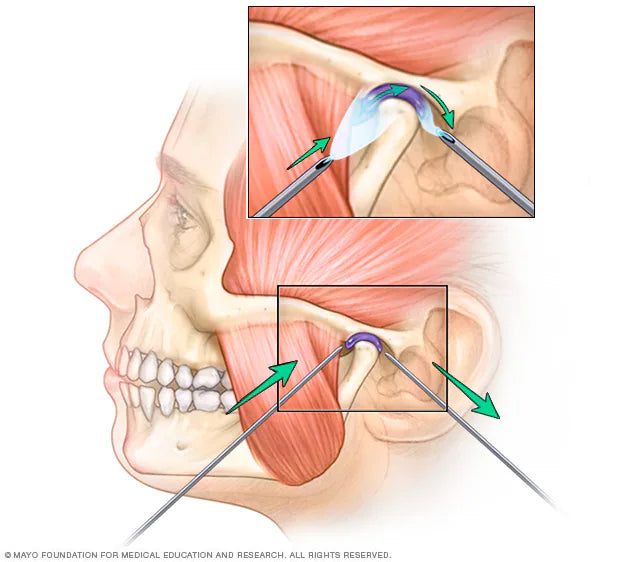Temporomandibular Joint Disorder (TMJ) is a frustrating and often painful condition that affects the jaw, making everyday activities like chewing, speaking, and even yawning uncomfortable. If you're searching for effective ways to relieve TMJ pain, you're not alone. Millions of people experience TMJ symptoms, but the good news is that there are various treatment options available. From simple at-home remedies to medical interventions, here’s a comprehensive guide on how to treat TMJ and find lasting relief.
1. Practice Jaw Relaxation Techniques
One of the main contributors to TMJ pain is muscle tension. Stress and poor posture can cause the jaw muscles to tighten, leading to discomfort and inflammation. Relaxation techniques such as deep breathing, guided meditation, and progressive muscle relaxation can help ease tension in the jaw. Additionally, practicing good posture and avoiding excessive jaw movement can significantly reduce strain on the temporomandibular joint.
2. Try Natural Relaxation Supplements
If jaw tension is a recurring issue, natural relaxation supplements may provide effective relief. TMJ ComfortPlus, for example, is formulated with calming herbs such as Valerian Root, Passionflower, Chamomile, and Lemon Balm. These ingredients are known for their muscle-relaxing and stress-reducing properties, making them a great option for those looking to support jaw relaxation naturally. Taking a supplement designed for TMJ relief can help manage symptoms and prevent flare-ups without the risks associated with NSAIDs or prescription medications.
3. Apply Heat or Cold Therapy
Applying a warm compress to the jaw can increase blood flow and promote muscle relaxation, reducing pain and stiffness. On the other hand, using an ice pack can help numb the area and decrease inflammation. Alternating between heat and cold therapy is often effective for managing TMJ discomfort.
4. Perform Jaw Exercises
Jaw exercises can strengthen the muscles around the temporomandibular joint and improve mobility. Some effective TMJ exercises include:
- Relaxed jaw exercise: Gently rest your tongue against the roof of your mouth and allow your jaw to relax.
- Goldfish exercises: Slowly open and close your mouth while keeping your tongue in place.
- Chin tucks: Pull your chin back while keeping your head level to help correct posture and reduce strain. Consistency is key when it comes to TMJ exercises. Performing them daily can help improve jaw function and reduce pain over time.
5. Avoid Hard or Chewy Foods
Your diet plays a role in TMJ management. Hard, chewy, or sticky foods can exacerbate jaw pain by putting extra strain on the joint. Instead, opt for soft foods like yogurt, smoothies, mashed potatoes, and steamed vegetables. Cutting food into smaller pieces can also make chewing easier and less stressful on the jaw.
6. Use a Night Guard or Mouth Guard
Bruxism (teeth grinding) is a common cause of TMJ pain, often occurring during sleep. A custom-fitted night guard or mouth guard can help prevent grinding and clenching, reducing stress on the temporomandibular joint. If you suspect that you grind your teeth at night, consult with your dentist to find the best guard for your needs.
7. Consider Physical Therapy
Physical therapy can be highly effective for TMJ relief. A trained therapist can teach you specific exercises to improve jaw function, release muscle tension, and correct posture-related issues. Some physical therapists also use manual techniques such as myofascial release and trigger point therapy to alleviate TMJ-related discomfort.
8. Explore Medical Treatment Options
If your TMJ symptoms persist despite trying home remedies, a medical professional may recommend additional treatments such as:
- Prescription muscle relaxers or anti-inflammatory medications to reduce pain and tension.
- Corticosteroid injections to decrease inflammation in severe cases.
- Botox injections to relax overactive jaw muscles and prevent clenching.
- Surgical interventions (as a last resort) for cases where structural issues are causing severe TMJ dysfunction.
Finding the Right TMJ Treatment for You
TMJ symptoms can vary from mild discomfort to chronic pain, so finding the right treatment often requires a combination of approaches. Start with natural remedies like relaxation techniques, jaw exercises, and supplements like TMJ ComfortPlus to support muscle relaxation and overall jaw health. If symptoms persist, consider seeking professional guidance to explore additional treatment options.
By taking proactive steps to manage TMJ, you can reduce pain, improve jaw function, and enhance your overall quality of life. Have you found an effective way to relieve TMJ pain? Share your experience in the comments below!

